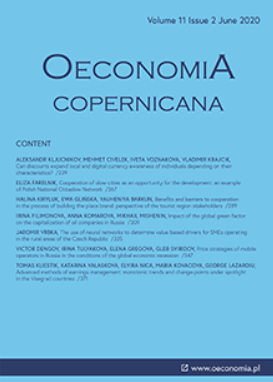Is internationalisation beneficial for novice internationalisers? The performance effects of firm-specific advantages, internationalisation degree and firm size revisited
Is internationalisation beneficial for novice internationalisers? The performance effects of firm-specific advantages, internationalisation degree and firm size revisited
Author(s): Krystian Barłożewski, Piotr TrąpczyńskiSubject(s): Business Economy / Management, International relations/trade, Financial Markets
Published by: Instytut Badań Gospodarczych
Keywords: firm internationalization; multinationality; firm performance; Central and Eastern Europe; firm-specific advantages;
Summary/Abstract: Research background: Research on the performance outcomes of different forms of internationalisation has attracted significant attention due to its theoretical and practical relevance. Still, the related findings have remained conflicting. Scholars have argued that companies need to possess or acquire firm-specific advantages (FSAs) to succeed internationalisation. However, a significant part of International Business (IB) research has treated FSAs as enablers of internationalisation, while some have argued that internationalisation in itself only helps firms translate the possessed resources into performance. Purpose of the article: The objective of this study, which is based on the resource-based view (RBV), is to explore the moderating effect of internationalisation on the relationship between FSAs and performance, considering internationalisation degree and firm size as boundary conditions for that relationship. Methods: We carry out statistical analyses on a longitudinal dataset containing 304 novice internationalisers from the post-transition economy of Poland and a total of 1167 firm-year observations. Thereby, we compare SMEs with large firms. Findings & value-added: We find that while FSAs do positively affect firm performance, this relationship becomes weaker for higher levels of internationalisation. However, the negative moderating effect of the internationalisation degree becomes weaker for larger novice internationalisers, which are more able to handle the complexity of managing foreign operations.
Journal: Oeconomia Copernicana
- Issue Year: 12/2021
- Issue No: 1
- Page Range: 53-75
- Page Count: 23
- Language: English

